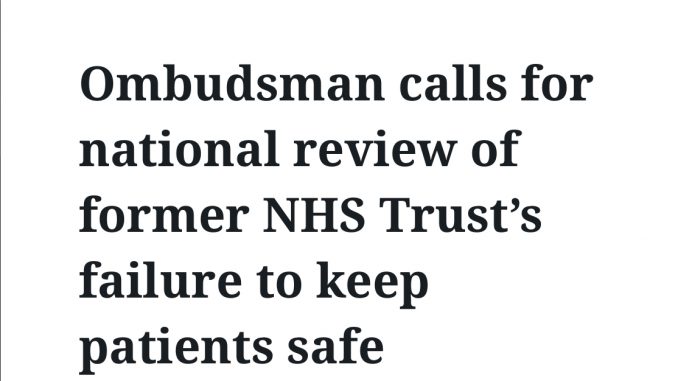
The Parliamentary and Health Service Ombudsman has today called for a national review into years of potential failings to ensure patient safety at the North Essex Partnership University NHS Foundation Trust (NEP)[1].
This follows the Ombudsman’s investigations into the deaths of two vulnerable young men, which found a series of significant failings in their care and treatment. Both of their families suffer the ongoing injustice of knowing that their sons did not receive the standard of care they should have done, which has caused them unimaginable distress.
NHS Improvement (NHSI) has agreed to establish a review in line with our recommendations and will share any learning it identifies across the NHS as needed. The review will only commence once a current Health and Safety Executive (HSE) investigation into NEP has concluded. The review will also consider whether there is sufficient evidence for a recommendation to be made to the Secretary of State for Health and Social Care for a public inquiry.
The Ombudsman’s investigations
Mr R died in 2008. He was admitted to the Linden Centre at NEP with an early diagnosis of ADHD and was at risk of taking his own life.
The Ombudsman’s investigation into Mr R’s case found that there were missed opportunities to mitigate the risk of him taking his own life. While NEP acknowledged that staff did not respond adequately when Mr R threatened to harm himself, the Ombudsman found the Trust failed to adequately manage his ward leave and properly assess and manage risk.
Matthew Leahy died in November 2012, aged 20. On 7 November 2012 the police brought Matthew to NEP’s Linden Centre as a place of safety and he was admitted under the Mental Health Act. He had been previously diagnosed as having delusional disorder.
While some aspects of Matthew’s care and treatment were in line with relevant guidelines, the Ombudsman’s investigation found that NEP did not have an updated care plan in place, he was not adequately observed, NEP did not properly allocate a keyworker to him or respond appropriately when he reported being raped. Finally, NEP’s record keeping was not robust as some paperwork was lost and Matthew’s care plan was written after his death.
The Ombudsman also found in Matthew’s case that NEP’s investigation into his death was inadequate and the Trust was not open and honest with his family about what was being done to improve safety at the Linden Centre.
Rob Behrens, Parliamentary and Health Service Ombudsman, said:
‘These vulnerable young men and their families were badly let down by North Essex Partnership Trust. The lack of timely safety improvements following their deaths is completely unacceptable and it’s important the NHS understands why this happened and what lessons can be learned to prevent the same mistakes happening again.
‘I am pleased that NHS Improvement (NHSI) has accepted our recommendation to review what happened at the Trust and to share the findings from this with parliament and the wider health system.’
As part of the investigation into Matthew’s death, the Ombudsman developed a timeline of other evidence indicating systemic failings in properly addressing issues of patient safety at NEP over more than a decade. This evidence includes the findings from a Coroner’s inquest, a number of critical Care Quality Commission (CQC) inspection reports and criticisms by Essex Police, which although not reaching the evidential threshold for a charge of manslaughter, identified ‘clear and basic failings’ in its investigation.
Melanie and Michael Leahy, parents of Matthew, said:
‘The passing of our son Matthew James Leahy has left a void that nothing can fill. Not a day passes when we do not miss him and despair at the thought of how his life was cut short, so needlessly.
‘Our son was ready to go travelling and celebrate his 21st birthday. He should never have died. Sectioned under the Mental Health Act, he was alone, scared and failed in the most appalling way by those entrusted with his care.
‘We want the public to know what happened to our son so this never happens again.’
Following the Ombudsman’s investigation into Mr R’s case, wrote to them to formally apologise and set out the action taken to improve its services.
Following Matthew’s case, the Ombudsman recommends that within two months, the Essex University Partnership NHS Foundation Trust should:
- write to his mother, Mrs Leahy, to formally apologise and acknowledge the failings,
- provide a detailed action plan explaining what has been done to prevent recurrence of the failings.
